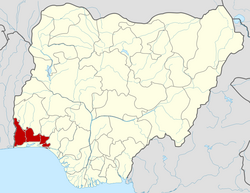This article has multiple issues. Please help improve it or discuss these issues on the talk page . (Learn how and when to remove these messages)
|
Ipokia | |
|---|---|
LGA and town | |
| Coordinates: 6°32′N2°51′E / 6.533°N 2.850°E | |
| Country | |
| State | Ogun State |
| Government | |
| • Local Government Chairman | Johnson Akohomeh AVOSEH (APC) |
| Area | |
• Total | 629 km2 (243 sq mi) |
| Population (2006 census) | |
• Total | 150,426 |
| Time zone | UTC+1 (WAT) |
| 3-digit postal code prefix | 111 |
| ISO 3166 code | NG.OG.IP |
 | |
Ipokia is the metropolitan headquarters of Anago kingdom. It is an ancient kingdom in old Oyo empire. Unlike the other kingdoms, which had at one time or the other engaged in the internecine wars that ravaged Yorubaland in the nineteenth century, Ipokia stood out as an unconquered sanctuary city-state throughout the period. The year it was founded was not known but can be traced to 13th to 14th century when some prince and princess of Oramiyan, the 6th Ooni of Ife and founder of Oyo and Benni kingdom migrate from Oyo ile and settled in Ajase Ipo in present-day kwara state due to a little misunderstanding among the prince, then move downward toward west Lagos with the ancient crown gotten from their forebears , Oduduwa. settled briefly in Lagos shores, Isale Eko before coming to Badagry axis and finally settled down and formed a small town named Ipokia meaning (Opo ko ara e sile, I.e Opo rejected its people) with the help and guidance of Ifa Oracle. Ipokia came to be a Local Government in 1996 carved from formally known as "Egbado south local government" but now "Yewa South local government" in the west of Ogun State, Nigeria bordering the Republic of Benin. Its Capital is in Ipokia town. It is an exit route from Nigeria to outside world through road and water. It is also regarded as main gate to the gateway state due to its proximity and the boundary between Nigeria and Benin Republic. There are other towns like Idiroko, Oniro, Ita Egbe, Aretedo, Ihunbo, Agosasa, Aseko, Maun, Koko, Ropo, Alaari, Tube, Ilashe, Ifonyintedo, Madoga, Idosemo, Ijofin and Tongeji Island in the town of Ipokia at 6°32′00″N2°51′00″E / 6.53333°N 2.85000°E .
Contents
- Minerals/Natural resources
- Tourism
- Famous foods
- Languages
- Postal information
- Notable towns and villages
- References
It has an area of 629 km2 and a population of 150,426 at the 2006 census. It the capital of Ipokia Local Government. The current traditional ruler (King) is Oba Yisa 'Sola Adeniyi Adelakun Olaniyan (JP), The 46th Onipokia of Ipokia kingdom. First class Obas who are in the same category with Alake of Egbas, Awujale of Ijebus and some other few first class Obas in Ogun State.

